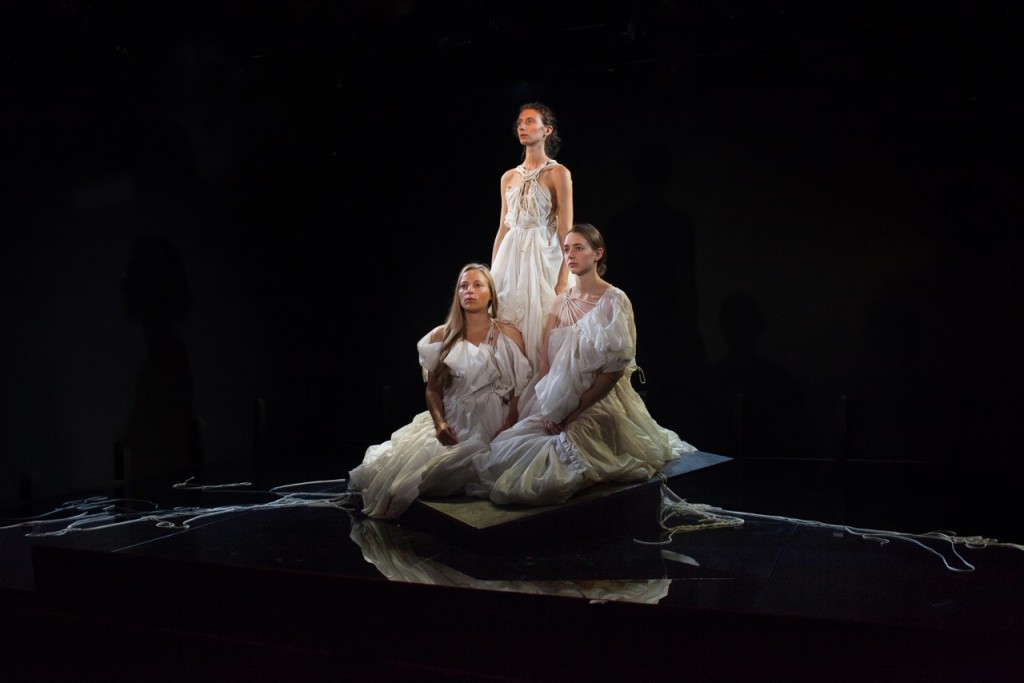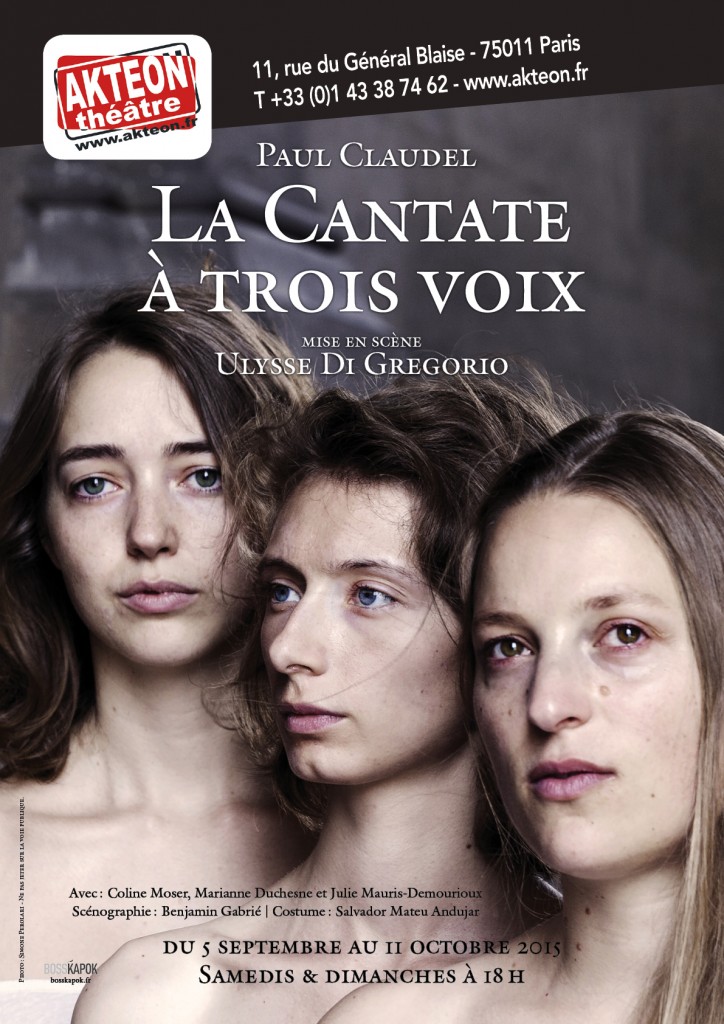Title : La Cantate à Trois Voix
Duration: 1h10
Stage direction : Ulysse Di Gregorio
Scenography : Benjamin Gabrié
Costumes : Salvador Mateu Andujar
THE PLAY
‘This gold-like thing that turns to snow’. In this night ‘this time that is between Spring and Summer’, three women Laeta, Fausta and Beata meet to sing about nature and the lover that is expected far away or disappeared. Standing on the terrace of the Castle Hostel in the county of Valromey these three voices feel of the proximity of the Rhone, of the golden wheat and the scent more mystical still, of the rose.
Laeta, the allergory of youth and ‘happy girl from the Latin soil’ awaits with virginal impatience, her promise, who is to return by the Rhone. The man becomes the image of the Rhone, ‘torrent, swollen river, powerful and liberating’. Laeta salutes with joy, profound and grave this Rhone and this man who will soon come to take her and make her his wife. Love and desire take hold of the young woman in all their violence and transport her as the water of the river towards an unknown bank.
A ‘shore’ that the blonde Fausta already knows but that she finds impossible to reach. Exiled from her land, Poland, she has turned to toiling the land. She has become a farmer and has acquired many fields in order to sow again all the ‘gold’ from her country. Her husband, having left for a ‘mission without hope’, only unconditional love and expectation remain. However, it is by no means a complaint but more screams stretching between pain and supreme happiness in front of life’s trial.
A lament, at the same time profoundly tragic and profoundly happy that Beata ‘the obscure Egyptian’ thinks to us ‘The Song of the Rose’ as opposed to the one of the ‘Rhone’ praises femininity and bountiful earth. The song becomes mystical and bare finally reaching its paroxysm with the loss of a loved one.
‘Only his absence brings us to life’.
‘During the deadly Winter and the uncertain Spring, in between the thorny leaves creates at last, the perfect red flower of desire and it’s ardent geometry’.
The extreme tension between ‘life and death’ where the three sisters find themselves, leads to the burning question continually asked of man and his condition ‘precarious and miserable’.
Who dicates our destiny and our path?
How can the end of our existence also be our achievment? Is it in the piercing questioning that the Cantata achieves its rhythm at the same time as the dawn.
The three voices tail off, composed and at peace in the serenity of the soul, separated from the body.
DIRECTORS NOTE
I am particularly sensitive to the musical quality of the words and sentences to the rhythm, to the intensity as well as the tone.
I have therefore, treated the Cantata like a musical score in which are mixed, distinctly feminine voices in the song of the soul, expressing the feeling of three hearts facing the absence of the loved one in a symphony of emotions: hope, suffering and doubt.
Claudel composed those songs without music but as the title indicates, he invites the listener to hear these three voices in the way one would listen to one of Schubert’s trios; enveloping one’s entire being and finally delighting it despite the anguishes and the struggles leaving it enraptured in an ethereal world.
I have derived colour and images from this text. Raging and bitter like that river where the three women like a Greek choir – the new ‘Parques’, weave with their song the thread of their lives and misfortunes, those ruptures that rip the heart out and leave it damaged but still beating.
This land fertilised by the waters of the Rhone basking in the sun’s life-giving rays, swept by the Mistral has borne its fruit. ‘The wheat of faith and the wine of hope’ to use a Caudelian expression and feel at one with those three souls.
This text offered me the opportunity to immerse myself to extract an essence of it, delivering to the spectator a concentrate of sobriety and mystical and enlightened strength.
Ulysse Di Gregorio
“Les jeunes et talentueuses interprètes de la cantate à trois voix, Coline Moser, Marianne Duchesne, Julie Mauris-Demourioux l’ont compris, l’eau d’un poème ne s’arrête pas. Il ne faut surtout pas chercher à l’emprisonner, il faut y croire simplement.” theatreauvent.blog.lemonde.fr
“La Cantate à trois voix d’Ulysse Di Gregorio, une mise en scène magistrale servie par d’excellentes comédiennes” www.theatrotheque.com
“L’effet est saisissant : la poésie devient théâtre, puisque les trois personnages souffrent et entremêlent leurs âmes ensemble. Les trois comédiennes sont simplement magnifiques…” www.froggydelight.com
“Dans cette proximité d’une mise en scène qui réussit à opposer et à unir ces trois élégies, la langue claudélienne palpite d’une contagieuse jeunesse.” www.webtheatre.fr
Coline Moser……………………………………………………………….Fausta
Marianne Duchesne……………………………………………………..Beata
Julie Mauris-Demourioux……………………………………………..Laeta



